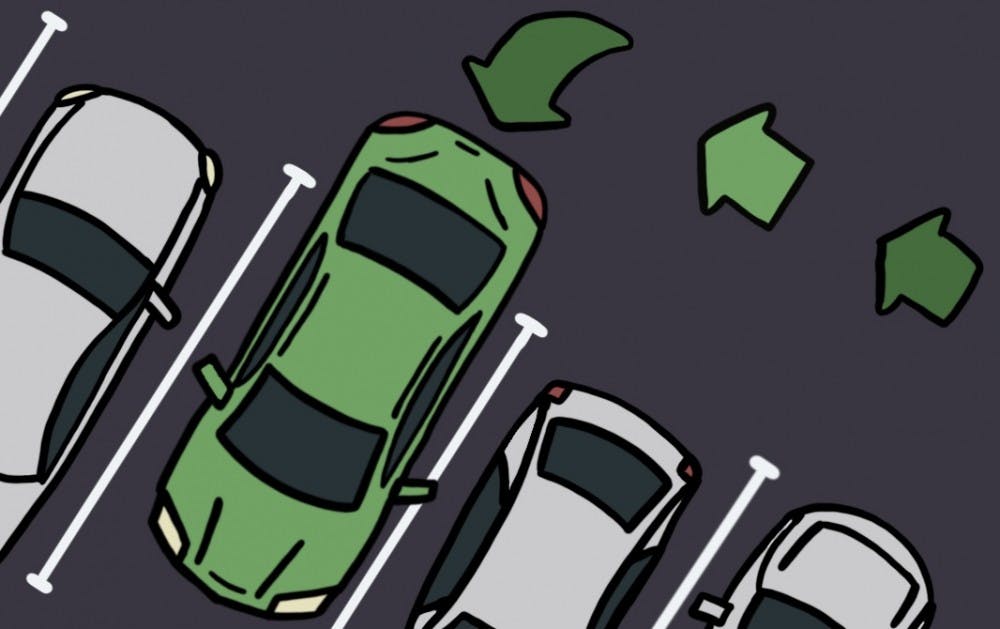Many ASU students and faculty who commute to campus for school and work find it necessary to purchase a parking pass for the year.
However, when these commuters purchase parking passes, they should be aware that they are not only funding their own need to commute, but they are also funding everyone else’s transportation, which, if they have cars, they will probably never use.
Although ASU's Parking and Transit Services provide many sustainable methods of getting around and between campuses, none of these programs are funded in a sustainable manner.
Currently, all services provided by the PTS are funded by the sale of parking permits and visitor parking, Melinda Alonzo, the director of ASU’s Parking and Transit services, said.
“The revenue stream is by selling permits,” Alonzo said. “And that, in turn, helps pay for and support our intercampus shuttles, services, alternate modes, bike programs, infrastructure we’ve put in place (and) walk-only zones helping keep the Tempe campus malls safe. It also goes to improving lots and building future parking structures.”
The more people bring cars onto campus, the more PTS can fund sustainable transportation programs. However, this is no great stride towards sustainability, as these programs depend entirely on a certain percentage of ASU students and faculty to drive their cars.
ASU also does not include transportation in student fees like some other universities.
“The University, everyone who pays tuition and the University monies that come in, none of that goes to sustain the parking and transportation program,” Alonzo said. “It all comes from parking fees.”
Sustainable transportation at ASU also does not currently have its roots in sustainability, considering its source of revenue. If transportation service fees were included in student fees, like at NAU, sustainable transportation would function independently from parking pass revenue.
Students and faculty who drive and park on campus are paying not only for their parking spot, but for all other transportation services which other people use, creating a type of parking welfare system for campus commuters. This can put financial strain on students who cannot afford to live on campus and must pay the high price of parking.
Meanwhile, people who do not drive cars benefit from the transportation services paid for by individuals who drive.
“We don’t charge people to ride the intercampus shuttles,” Alonzo said. “It’s a service that isn’t free, but it’s not a charged service to get on.”
The current system in place necessitates unsustainable methods of transportation in order to provide sustainable initiatives. But these initiatives are not truly sustainable if they rely on unsustainable practices, such as driving a car, for funding.
Consequently, these public transportation programs would be left without funding if more people stopped driving and opted to bike or take the shuttle instead.
“It is a University goal to reduce our carbon footprint by reducing traffic and congestion as we move into the future,” Alonzo said. “Moving forward, we’re going to start looking at initiatives and ways we can incentivize and create solutions that can help people choose a more sustainable way of getting here.”
In order to move forward, however, sustainability should not have to rely on cars and their harmful emissions in order to succeed. Furthermore, people who need to drive should not be required to pay for services which they will rarely use.
“In the long run, it really is about balancing and making sure we have ample solutions in place that balance all of those varying needs,” Alonzo said. “We don’t believe we’ll get everybody to abandon their cars. I think there’s still some stuff out there with autonomous vehicles and all of that new type of technology that really could change things.”
The way that PTS is funded forces sustainability to rely on practices which hurt the environment, making clean methods of transportation not clean at all. As more and more people are presented with the choice to use environmentally-friendly forms of transportation, there will likely be a need to change PTS's source of funding in the future.
“If you think about it, theoretically, if we have to fund everything that we have to support, it’s going to have to come from parking fees,” Alonzo said. “At a certain point, there’s going to have to be some need for adjustment in the parking rate to help continue to support those other needs.”
Reach the columnist at kalbal@asu.edu or follow @KarishmaAlbal on Twitter.
Editor’s note: The opinions presented in this column are the author’s and do not imply any endorsement from The State Press or its editors.
Want to join the conversation? Send an email to opiniondesk.statepress@gmail.com. Keep letters under 500 words and be sure to include your university affiliation. Anonymity will not be granted.
Like The State Press on Facebook and follow @statepress on Twitter.




